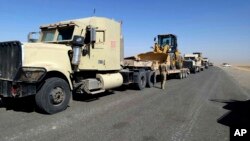Iraq's military closed in on Wednesday on the centre of Shirqat, a northern town held by Islamic State seen as a stepping stone in the campaign to recapture the jihadists' stronghold of Mosul.
The army, backed by local police and Sunni Muslim tribal fighters, have taken 12 nearby villages since launching the operation on Tuesday morning, said Ali Dawdah, the mayor of Shirqat currently based in Erbil.
With air support from a U.S.-led coalition, the troops are now less than 3 km (2 miles) from the town center, according to Dawdah, who said he expected the campaign to be concluded within 48 hours.
Five security personnel and one civilian have been killed in the battle for Shirqat, where they face hazards including roadside bombs, mortars and snipers, said the mayor and a source in the Salahuddin Operations Command which oversees military operations in the area.
Shirqat, on the Tigris river 100 km south of Mosul, has been surrounded by Iraqi troops and Iranian-backed Shi'ite Muslim militias allied to the government but so far the militias have not participated in the operation.
Tens of thousands of civilians are thought to be trapped in Shirqat and surrounding villages, which have been under Islamic State control since the group seized a third of Iraqi territory in 2014.
Officials have warned for months of a humanitarian disaster inside, where residents living under Islamic State's harsh rule say food supplies have dwindled and prices soared.
There has not been a large-scale displacement of civilians so far. Iraqi authorities hope the course of the battle will allow most residents to stay at home to avoid creating a humanitarian crisis as forces move towards Mosul.
Residents of Shukran and Houri villages told Reuters by phone they had begun waving white flags above their houses on Tuesday evening as the military advanced, but Islamic State punished them with 50 lashes each.
The behavior of the fighters and the treatment of Shirqat's residents will be closely watched by the million or so Sunni residents of Mosul, who have a historic mistrust of the forces of successive Shi'ite-led governments in Baghdad.
U.S. and Iraqi officials have said the push on Mosul could begin in October, though there are concerns that not enough planning has been done for how to manage Mosul, Iraq's second-largest city, if and when Islamic State is kicked out.





